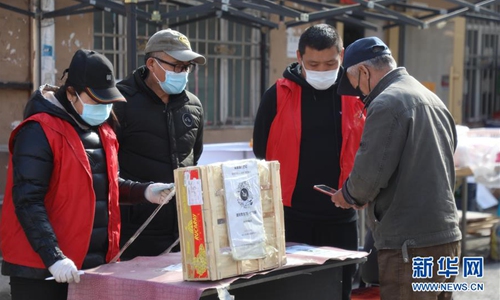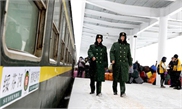
A resident is scanning the health code at a residential community in Suifenhe, Northeast China's Heilongjiang Province on April 10, 2020. Photo: Xinhua
Northeast China's border city of Suifenhe on Sunday announced it is now a medium-risk region for the COVID-19 outbreak, while the whole city has been put on high alert with the implementation of a special QR code to dissuade residents from leaving the city.
According to the announcement, if local residents need to leave the city under special circumstances, they have to provide a negative nucleic acid test certificate within three days to a quarantine station. For those who cannot provide a certificate in time in the event of an emergency, such as essential medical treatment or death of a family member, the exit quarantine station may let them go and send their information to the epidemic prevention authorities at the destination.
Suifenhe residents who leave the city must undergo medical quarantine and observation for 14 days in the destination city and receive two nucleic acid tests. The quarantine stations must strictly implement measures including a health code check, ID registration, temperature checking and registration for those entering and leaving the city, it said.
The city, which neighbors Russia, reported one imported case and zero new domestic infections on Saturday, while 344 imported cases are still being treated and 36 patients have recovered.
Heilongjiang Province's health authority has reported five new cases, including three cases that resulted from imported asymptomatic infections and two from close contacts.
Mi Feng, the spokesperson of China's National Health Commission, said at a press briefing on Sunday that with more than 90,000 new confirmed cases worldwide each day, the risk of imported cases continues to grow and there are still domestic cases.
"We need to overcome paralysis and laxity, and timely detection and rapid treatment must be guaranteed," the spokesperson added.
Global Times

